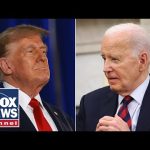In a world where the Middle East often feels like a jigsaw puzzle with too many missing pieces, President Trump took center stage, laying out bold ideas aimed at bringing stability to the region. During a recent press conference with Prime Minister Netanyahu, Trump toasted his visions of security and ownership that could change the landscape of foreign relations forever. He emphasized that the potential change could be a game-changer for both Israel and the broader Middle East, stating that this was not a spur-of-the-moment decision, but rather a well-thought-out plan backed by strong leadership. The president’s optimistic outlook may just stir the pot among allies and foes alike, but it certainly raises eyebrows.
One of the more striking proposals floating around is the idea of U.S. involvement in the Gaza Strip. While specifics were left tantalizingly vague, Congressmen described “ownership” in numerous ways, suggesting that America could be setting up a base or perhaps taking a more active role in developing the area. This could send seismic shockwaves across the region, asserting that the United States is fully committed to Israel’s safety. With a wink and a nudge, it was clear that Trump wants adversaries to know that the U.S. will not stand idly by. The message was loud and clear: whether it’s through negotiations or stern military letters, all options remain open.
As discussions heated up, the notion of possible U.S. troops on the ground was whispered into the air. Some may gasp in horror at the thought, but Trump’s team insists that projecting strength is key. Compared to the previous administration, which many believe was less assertive, this approach could mark a turning point. The gamble is big, but so are the potential rewards. A safer Israel and a less war-torn Gaza might allow people to finally swap conflict for anything resembling peace – if only the stars align.
However, there are hiccups in this plan that could put the proverbial brakes on everything. A key player in this game, Saudi Arabia, has made it clear that while it supports the establishment of a Palestinian state, it remains firm that diplomatic ties with Israel depend on this happening first. Meanwhile, Prime Minister Netanyahu has indicated there’s hope for normalization between the two countries. Yet, with each move, complications arise like weeds in a garden, suggesting that this is no easy feat.
Not to be left out, the ever-volatile Iran situation reared its head as President Trump announced a return to a maximum pressure campaign against the Iranian regime. This decision is rooted in the belief that aggressive sanctions last time around brought Iran to its knees. Observers recall when Iran was facing immense pressure under the previous Trump administration, a stark contrast to current approaches that many believe have left the door wide open for aggression. Trump’s team seems intent on clamping down on any nuclear aspirations, making it abundantly clear that a nuclear-armed Iran is off the table.
While the future remains uncertain, there’s no denying President Trump is attempting to shake up the foundation of the Middle East with a vision that could provide security not just for Israel, but for the region as a whole. Whether this approach will foster the peace and stability everyone yearns for or lead to further complexities remains to be seen. But one thing’s for sure: with every pivot and turn in this geopolitical chess game, observers will be watching closely and holding their breath to see how it all unfolds.




